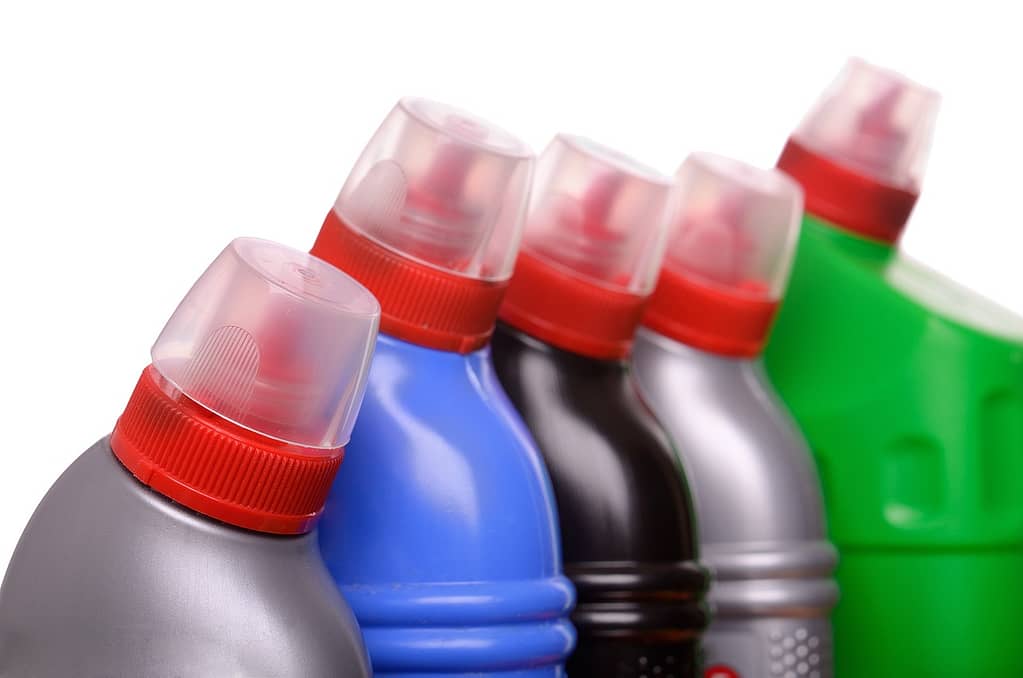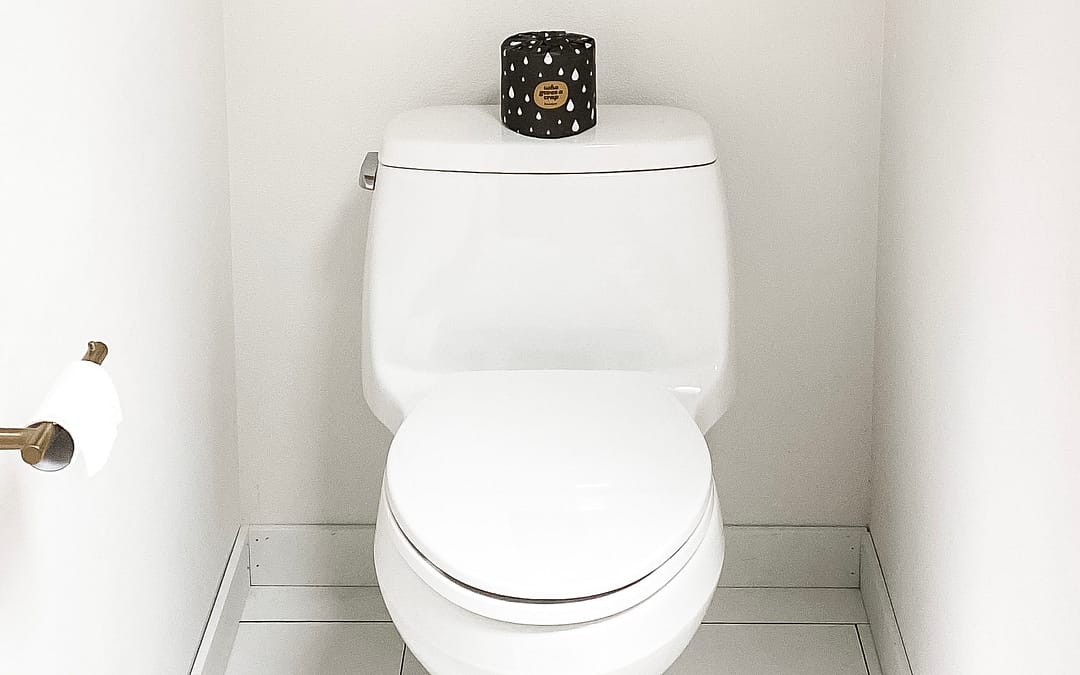This article may contain compensated links, please read our disclaimer for more information.
Nobody likes to talk about them, but every RVer has one: your RV toilet. Unfortunately, these things must be routinely cared for in order to ensure they continue to function without issues. And one major part of caring for an RV toilet? Learning to use RV toilet chemicals.
If you have a traditional RV toilet (and the vast majority of us do), chemicals for RV toilets are very likely to become a regular part of your day-to-day life. Here’s everything you need to know about them before you dive in.
What are RV Toilet Chemicals?
First, let’s take a minute to talk about what exactly RV toilet chemicals are. Basically, these chemicals are created to help break down solids in your RV black tank and to reduce smells in both your black tank and your gray water holding tank.
The chemicals come in both liquid form and in little packets that dissolve in water. The liquid form can be bought in a large jug, or in some cases in smaller single-use bottles. No matter which form your RV toilet chemicals take, they are made to do the same job—one that really must be done one way or another.

Are RV Toilet Chemicals Necessary?
Sure, it is important to make sure TP and solid waste are properly broken down in your waste tank. It’s also true that you probably don’t want stinky sewer smells making their way into your RV home. But are chemicals for RV toilets actually necessary?
Many RVers are “natural” minded, meaning they prefer to avoid using chemicals in their homes. This leads many full timers to seek out alternative methods to caring for their black tanks without all the chemicals. The good news? There are other options!
The Water Method
The first alternative method is also the easiest and most cost-effective method. It involves one thing: lots and lots of water. A surprisingly large number of full time RVers use this method, and we’ve honestly had good luck with it too.
To use this method, you do have to make sure you fill the bowl every time you use the restroom, and you’ll want to use extra when you go number 2.
This means the black tank fills pretty quickly, something that isn’t necessarily a problem when full hookups are available but can become an issue if you spend a lot of time boondocking. On top of that, you really need to give the tank a good rinsing after every dump, something that can be difficult if you aren’t sitting on a full-hookup site.
We think the water method is a great choice if you spend most of your time in full-hookup RV parks, but if you want to dry camp regularly, another method might be better for you.
The Geo Method
We’ve also heard a huge number of people swear by the “Geo method” of caring for their black tank. This does involve putting some products down the drain, but nothing very strong, and you might even have most or all of the ingredients for the Geo method sitting around your RV already.
All you have to do is add two cups of water softener (such as Calgon) to a gallon of hot water. Pour that into your tank along with a cup of Dawn dish soap and ¼ cup of Borax. This might seem unconventional, but if it works, it works!
The Best RV Toilet Chemicals
Maybe you tried the water method and it isn’t working out. Perhaps the Geo method is a bit too much effort. The next step is to turn to store-bought RV toilet chemicals and treatments.
Fortunately you have a lot of options, including some eco-friendly options for those who prefer to avoid harsh chemicals in their homes. These are what we prefer ourselves, and we have only included such products on our list below of the best RV tank treatments.
Happy Campers
Happy Campers is one of the most environmentally friendly tank treatments on the market. It can be used in both black and gray tanks, it’s fine for septic tanks, and it works by promoting the growth of good bacteria, meaning it continues to work long after it’s added to the tank. Most importantly, this product does an excellent job of preventing smells.
TankTechsRX
Another product that won’t harm the environment, TankTechsRX uses probiotics to promote healthy good bacteria growth in your tank. Again, it is safe for septic systems and does its job well. Just make sure you leave a little waste in the tank after dumping in order to maintain the probiotic growth.
Unique RV Digest It
Finally, there is Unique RV Digest It. This product uses both probiotics and enzymes to break down waste and neutralize odors. It does not use perfumes to make smells—which we very much appreciate—and it helps clean sensors so you’ll know when your black tank is actually full.
Alternatives to RV Chemical Toilets
As mentioned above, pretty much every RV out there comes with an RV chemical toilet, which uses a black tank to hold waste. That said, it is possible to replace the traditional toilet with something that better suits your needs.
If you find that your RV toilet isn’t working for you, consider one of the following options, which will allow you to avoid using chemicals for RV toilets and provide other benefits to boot.
Cassette Toilet
A cassette toilet is very much like a traditional RV toilet, but instead of a black tank attached to the RV, there is a small waste tank attached to the toilet itself. This smaller tank can be removed and carried to a toilet or dump station to be dumped, making it easy to get rid of waste even when a dump station isn’t available.
Some people use RV toilet chemicals in cassette toilets, but because the tank is emptied more frequently and can be cleaned more easily, we find it isn’t necessary.
Composting Toilet
Composting toilets are super popular with boondockers because they don’t use any water at all. Solid waste goes into a storage bin, where it is left to break down into compost. Meanwhile, liquids are diverted and sent to a small tank that can be emptied outdoors, into a public toilet, or into a dump station.
Some people choose to divert liquid waste to their gray tank instead. In any case, you will not have to use RV toilet chemicals with a composting toilet, but you will need something to sprinkle into the toilet after each time you go number 2, as well as a vinegar spray to spray into the urine tank.
Incinerating Toilet
Finally, there is the incinerating toilet. This type of toilet is perfect for boondocking, but is unfortunately very expensive. Waste is literally burned into ash, which is then stored until it can be collected and thrown out.
There is no water involved, nor are there chemicals involved. However, you will need to buy liners (which can be pricey) as well as propane for running the toilet incinerator, so keep those things in mind!
There you have it, everything you need to know about RV toilet chemicals, as well as some alternatives to using these chemicals for RV toilets in your tiny home. Which route will you take? We recommend experimenting with many solutions until you find the perfect option for you and your family.
Join Fulltime Families
Fulltime Families Members get access to the best resources, community and discounts.
Fulltime Families is a participant in the Amazon Services LLC Associates Program, an affiliate advertising program designed to provide a means for sites to earn advertising fees by advertising and linking to amazon.com, amazon.co.uk, amazon.ca. Amazon and the Amazon logo are trademarks of Amazon.com, Inc. or its affiliates.


